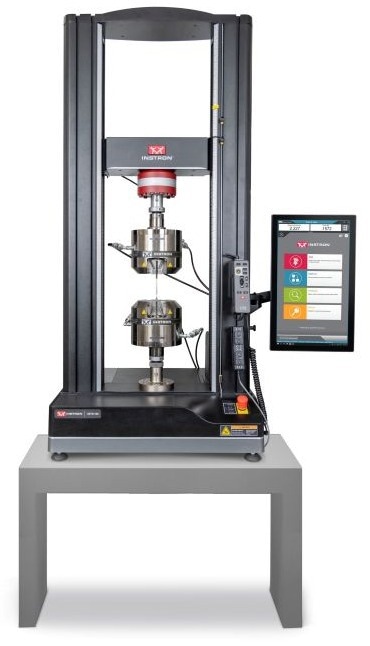Instron® is excited to announce the release of its new 100 kN table model for the 6800 and 3400 Series universal testing systems. Delivering unprecedented force capacity in a tabletop frame, it offers a powerful and space-efficient solution for labs testing materials such as metals and composites.
 Image Credit: Instron®
Image Credit: Instron®
Until now, materials testing labs could achieve testing forces of 100 kN only with Instron’s floor model systems, but thanks to recent engineering advancements, they can now gain all the needed testing power from a model that reduces the footprint by 40 % — eliminating a common hurdle for many space-constrained facilities.
Because power constraints can pose another obstacle in many labs, the new 100 kN model operates off a standard electrical outlet — similar to Instron’s other table model systems — alleviating concerns about limiting placement options in the lab or needing an electrician to perform wiring upgrades.
While this versatile model capably handles a range of materials such as plastics and elastomers, it is primarily designed to test high-strength metals, alloys, and composites that commonly require force capacities in excess of 50 kN — the previous maximum for Instron table models — enabling labs to meet standards like ASTM E8 and ISO 6892. It is also capable of meeting stringent Nadcap alignment requirements when equipped with suitable accessories.
Among other advantages, the new table model enables strain control, a key benefit for metals manufacturers and labs that need to achieve repeatable, comparable results across different machines and locations.
Both the table model and floor model 100 kN systems are built by Instron to be versatile and handle low-force as well as high-force testing capacities. For lab managers, the choice primarily comes down to available space, power capabilities, and budget.
“We introduced this table model as a way to give this important market the flexibility to test how they want, whether that’s in a smaller or larger form factor,” said Instron product manager Joseph Blenkhorn. “Many of our customers who use table models want to expand their testing capabilities as they work with stronger materials. Now, with the 100 kilonewton model, they can future-proof their labs from a capacity standpoint.”
The new table model is compatible with nearly all of Instron’s 100 kN accessories for testing alloys and composites — plus hundreds of accessories used for plastics, elastomers, and other materials. It is available in standard and extra height versions to accommodate numerous fixtures and frame accessories, including temperature chambers for non-ambient applications.